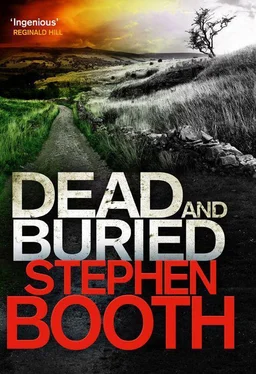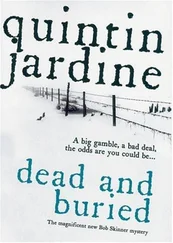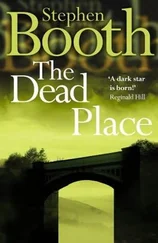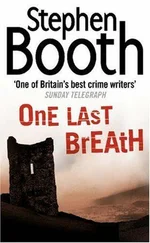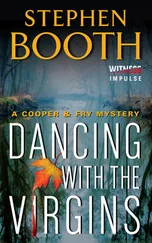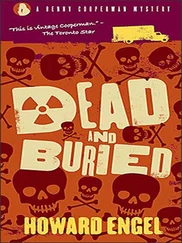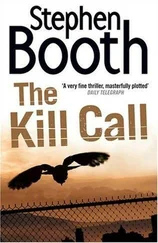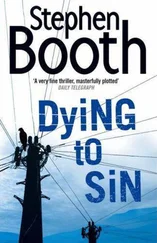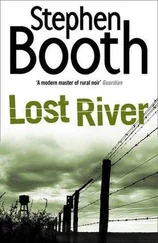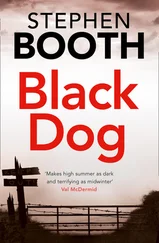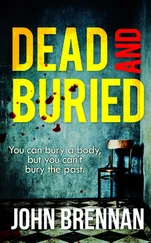Stephen Booth - Dead And Buried
Здесь есть возможность читать онлайн «Stephen Booth - Dead And Buried» весь текст электронной книги совершенно бесплатно (целиком полную версию без сокращений). В некоторых случаях можно слушать аудио, скачать через торрент в формате fb2 и присутствует краткое содержание. Жанр: Полицейский детектив, на английском языке. Описание произведения, (предисловие) а так же отзывы посетителей доступны на портале библиотеки ЛибКат.
- Название:Dead And Buried
- Автор:
- Жанр:
- Год:неизвестен
- ISBN:нет данных
- Рейтинг книги:4 / 5. Голосов: 1
-
Избранное:Добавить в избранное
- Отзывы:
-
Ваша оценка:
- 80
- 1
- 2
- 3
- 4
- 5
Dead And Buried: краткое содержание, описание и аннотация
Предлагаем к чтению аннотацию, описание, краткое содержание или предисловие (зависит от того, что написал сам автор книги «Dead And Buried»). Если вы не нашли необходимую информацию о книге — напишите в комментариях, мы постараемся отыскать её.
Dead And Buried — читать онлайн бесплатно полную книгу (весь текст) целиком
Ниже представлен текст книги, разбитый по страницам. Система сохранения места последней прочитанной страницы, позволяет с удобством читать онлайн бесплатно книгу «Dead And Buried», без необходимости каждый раз заново искать на чём Вы остановились. Поставьте закладку, и сможете в любой момент перейти на страницу, на которой закончили чтение.
Интервал:
Закладка:
‘Hello!’ he called. ‘Anyone here?’
The sound of his own voice echoed back to him. He wasn’t certain what part of the building he was in. He had never used this side door when the pub was open. He might be somewhere near the kitchens, he couldn’t be sure. He would have to wait a few minutes for his eyesight to adjust to the darkness.
Merritt took a step forward, hands outstretched to feel for the presence of a wall or doorway. His boots crunched on broken glass. The noise sounded unnaturally loud, as if the glass had been left there deliberately as a warning of intruders.
‘Hello? Hello?’
There was no answer. Or was there? Did he detect a faint rustle in the darkness, the sound of breathing that wasn’t his own?
He turned quickly, overwhelmed by a sudden fear that there was someone behind him in the blackness. The broken glass squealed under his boots like a small creature crushed to death against the concrete.
‘Is that …? Is …?’
But the blow on his skull came out of nowhere. Merritt cried out in pain, saw flashes of blinding light in the darkness, felt his legs begin to crumple. Then a second impact drove consciousness from his brain, and he hit the floor, stunned and bleeding, with fragments of glass pressing into his skin, his eyelids twitching as his nerve endings spasmed in agony.
As he lay face down in the dust, Aidan Merritt never felt the third blow — even though it was the one that killed him.
2
The E Division headquarters building in Edendale was starting to look a bit grubby these days — in some parts as grimy as if it had been in the middle of a fire itself. Outside, the woodwork hadn’t been painted for a while, and the stone facing was becoming dark and mottled. Even the brackets for the lights near the security cameras looked as though they were being slowly eaten by acid rain.
As Cooper drove up West Street towards the police station, it seemed that only the rails to the disabled ramp stood out, bright yellow and gleaming in the sun.
But no, he was wrong. There was one other patch of yellow noticeable on the front of the building — the public phone used to contact officers at times when the station was closed. And the times it was closed were becoming increasingly frequent.
When they’d gone through the security barrier and parked among the marked vehicles and CID cars at the back of the building, Cooper locked the Toyota and stood for a moment looking up at the hills above the town.
Edendale sat in a kind of shallow bowl. In every direction you looked, you saw hills. Any road you took out of town went uphill. In the streets down by the river, the climate could be totally different from what was happening up there on the moors of the Dark Peak. A bit of drizzle falling on shoppers on Clappergate could have turned into a snowstorm by the time you reached the Snake Pass on your way to Glossop.
Today, though the sun was shining on Edendale, Cooper could see that the moors to the north and west of the town were black with smoke. It had been another dry spring, with little rain falling on Derbyshire for months. Despite heavy falls of snow in the winter, the high expanses of peat moor soon dried out. And it didn’t even need to be warm — this spring certainly hadn’t been. The plateaux were constantly scoured by wind, which evaporated the moisture and left the peat and banks of heather parched and vulnerable to the threat of wildfires. One January a fire had ignited at minus five degrees Celsius, burning dry winter vegetation above soil that was still frozen solid.
Summer could be a bad time too, when the sun was hot and more visitors crowded on to the moors. But at least there was new growth of foliage then. In the spring, there was only the old vegetation, woody and desiccated. Firefighters called it the fuel load. This spring, the moors were like a vast tinderbox, just waiting for a spark to create these catastrophic fires.
With so much flammable material, and ideal conditions, the fires could burn for days, or for weeks. To the north, near Sheffield, a moorland fire had been smouldering continuously since 1978, after it burned down through the peat into underlying strata of coal. Once that happened, there was no way to put it out.
‘I remember fires like these when I was growing up,’ said Villiers, coming to stand at his shoulder. ‘I thought the whole world was coming to an end. It was like Armageddon. I can’t recall what year it was, but I was quite young.’
‘The worst year was 1976,’ said Cooper.
‘What? I’m not that old.’
‘Nineteen eighty, then. And 1995, 2003 — they were all bad years. All showed spikes in the number of moorland fires.’
For weeks now, national park rangers had been warning people not to light barbecues or camp fires, because of the higher than normal risk of fires. There had already been six moorland fires in the national park in the past two months.
Moorland fires could have a particularly devastating effect at this time of year, wiping out ground-nesting birds and even small mammals such as lambs, which couldn’t escape the advance of the flames. Wildfires not only harmed wildlife but destroyed rare plants and caused erosion. They undid years of hard work in managing those rare environments.
In the past few weeks alone, fires had broken out at Stanton Moor, at Ramshaw Rocks near Warslow, and on Moscar Moor near Ladybower Reservoir. Much of the land was owned by the water companies like United Utilities. In a way, that was an advantage: the companies couldn’t tolerate the resulting run-off into the water supply, so they were willing to cough up the money needed to hire helicopters at two thousand pounds an hour.
Over the Easter period in 2003, landowners had spent around sixty thousand pounds in five days on helicopters to help extinguish three simultaneous fires on Kinder and Bleaklow. There was no contribution to the cost from the state, and lobbying government to fund the use of helicopters had proved fruitless.
Ironically, one of the problems was developing sustainable water supplies out on the moors. The most difficult and severe fires were in remote, inaccessible locations. Water was usually some distance away — and the key to putting fires out was to get water on them. One of the biggest challenges was a logistical one. For years, the authorities had been talking about developing a network of ponds and pipelines across the moors to increase the speed of delivering water to a fire site. It hadn’t happened yet.
They walked towards the door of the station, and Villiers keyed in the security code. A prisoner transport vehicle had drawn up outside the custody suite, and a prisoner was being unloaded from the cage at the back.
Cooper had worked in this division for fifteen years, some of that time in section stations like Bakewell and Matlock, but most of it here at divisional headquarters in Edendale. He was becoming almost as well known as his father had been before him, that old-fashioned copper people in the town still talked about, both for the way he had spent his life and the way he’d died.
In the CID room, the atmosphere felt strained. Cooper detected it as soon as he walked through the door. He looked round the room. The two youngest DCs, Becky Hurst and Luke Irvine, were busy, their heads down, desks piled with paperwork, keyboards clattering, phones ringing intermittently. As usual, they were trying to deal with several things at once.
Meanwhile, the most experienced member of the team, DC Gavin Murfin, was amusing himself by filling in application forms for jobs he could never hope to get, and would never actually apply for. Today he was completing Form 518, the Specialist Post Application form for a Surveillance Operative at the East Midlands Counter Terrorism Intelligence Unit. He’d said yesterday that he liked the fact that the form was designated Restricted when complete.
Читать дальшеИнтервал:
Закладка:
Похожие книги на «Dead And Buried»
Представляем Вашему вниманию похожие книги на «Dead And Buried» списком для выбора. Мы отобрали схожую по названию и смыслу литературу в надежде предоставить читателям больше вариантов отыскать новые, интересные, ещё непрочитанные произведения.
Обсуждение, отзывы о книге «Dead And Buried» и просто собственные мнения читателей. Оставьте ваши комментарии, напишите, что Вы думаете о произведении, его смысле или главных героях. Укажите что конкретно понравилось, а что нет, и почему Вы так считаете.
